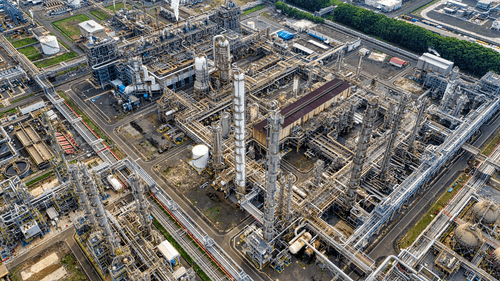UK nuclear careers: What you need to know
The nuclear industry is one of the UK’s most important sectors, powering around 15% of the country’s electricity in 2024, and supporting its journey to net zero. For jobseekers, UK nuclear careers offer the chance to work with cutting-edge technology, contribute to national critical infrastructure, and develop skills that will remain in demand for decades to come. That combination brings strong job stability and long-term career prospects.
Here’s a closer look at the opportunities and realities of what it’s really like to work on a nuclear site.
Is nuclear a good industry to work in?
Yes. The nuclear industry is expanding, fuelled by major infrastructure projects like Hinkley Point C and Sizewell C, and backed by long-term government commitment. Unlike sectors where demand fluctuates, nuclear is set to generate 25% of UK electricity by 2050, becoming a cornerstone of the UK’s long-term energy strategy. This translates into thousands of new jobs and reliable, long-term career prospects.
Is a career in nuclear right for you?
There are opportunities for those with STEM backgrounds, but also roles for people in trades, IT, project management, and compliance. A career in nuclear engineering isn’t the only route in; there’s space for a variety of skills.
A career in nuclear offers:
- Variety – from operating reactors to IT, cyber, and compliance.
- Progression – apprentices can progress to technician, engineer, and site manager roles.
- Competitive pay – the average salary for a nuclear engineer is between £45,000 - £52,000, significantly above the UK median of ~£37,430.
For some, it’s the technical challenge; for others, it’s the sense of purpose. If you’re curious, adaptable, and committed to safety, nuclear could be a great fit.
What jobs are available on a nuclear site?
When people think of nuclear jobs, they often picture reactor operators. In reality, nuclear sites operate like small cities, employing thousands of people across different disciplines. These can include:
- Nuclear engineering jobs – civil, mechanical, electrical, and control and instrumentation engineers.
- Nuclear operator jobs – such as Control Room Operator or Reactor Operator.
- Skilled trades – welders, fitters, electricians, and technicians.
- Safety and compliance roles – e.g. Radiation Protection Technician.
- IT and cyber specialists – securing critical digital systems.
- Project managers and planners – coordinating large, complex projects.
This variety makes nuclear one of the most diverse career sectors in UK infrastructure.
What skills are in demand in the nuclear industry?
The UK nuclear sector is expanding rapidly, and employers are actively searching for people with the right mix of technical expertise and transferable skills. If you’re considering a role in the nuclear industry, understanding what skills are in demand can help you focus your training and stand out to employers.
According to the Nuclear Industry Association, the UK's nuclear power workforce grew by 35% between 2021 and 2024, reaching 87,000 people.
Technical and specialist skills
- Engineering trades – welders, electrical & mechanical technicians, and fitters – remain in high demand as new plants and small modular reactors (SMRs) progress.
- Graduates of all levels, BSc, MSc & PhD with degrees in specialist subjects,, including mechanical, electrical, control, and instrumentation engineers, as well as graduates in physics, chemistry, and nuclear engineering.
- Safety, regulatory, and compliance professionals, including safety case authors, nuclear site licensing professionals, and regulatory compliance professionals.
- Manufacturing and advanced production professionals, such as materials engineers and precision manufacturers, are high in demand due to being closely linked to SMRs.
- Software, Systems & Safety Critical Systems Engineers – responsible for ensuring compliance with strict nuclear safety standards (e.g., IEC 60880, IEC 61513).
Transferable and soft skills
- Effective problem-solving and analytical thinking are essential for complex, bespoke projects.
- Communication and coordination are crucial for multi-disciplinary projects, which require collaboration across engineering, compliance, and regulatory teams.
- The need for project managers and team leaders is on the rise.
- Adaptability and continuous learning are crucial in keeping up with new reactor technologies and regulatory changes.
- Specialist expertise in areas like physics, shielding, and coding can be successfully applied in the nuclear sector, with professionals often transitioning from industries such as healthcare, rail, or aerospace.
- Professionals with backgrounds in Electrical, Mechanical, or Instrumentation & Control (I&C) can transfer their expertise from sectors such as oil and gas or aviation, where the skills gained in monitoring and control systems can be closely aligned with those required in nuclear plant operations.
What qualifications do you need to work on a nuclear site?
Entry requirements depend on the role. Many employers offer apprenticeships, graduate schemes, or vocational training, making nuclear accessible beyond the traditional degree path.
- Apprenticeships & Graduate Schemes – for trades and technical roles, e.g., EDF’s programmes at Hinkley Point and the NDA Graduate Schemes
- Work & Learn Graduate Schemes – for trades such as Project Management, Project Controls and Engineering, these are offered by leading nuclear companies such as BAE Systems, AtkinsRealis, and EDF, where you will spend 50% of your time on the job learning and 50% at university.
- Degrees of all levels, BSc, MSc or PhD, especially those in engineering, physics, or maths, are highly valued.
- Vocational training – for safety and maintenance roles.
Most roles also require mandatory training in radiological safety, emergency preparedness, and health and safety to ensure every worker has the knowledge to keep themselves and others safe.
What security checks are needed to work in nuclear?
Because nuclear is part of the UK’s critical infrastructure, security is strict. All workers must complete screening before starting.
The entry-level verification is the Baseline Personnel Security Standard (BPSS), which covers:
- Identity verification
- Right to work in the UK
- Employment history (usually the past three years)
- Unspent criminal record checks
BPSS clearance checks typically take 1–3 weeks if documents are ready. For some roles, higher clearance such as SC (Security Check) or DV (Developed Vetting) is required.
The process is structured and straightforward, as long as your documents are in order. If you’re unsure what to expect, working with a recruiter who understands BPSS screening can guide you through the steps and make the process smoother.
Are nuclear jobs safe? What are the risks?
Nuclear sites are among the most tightly regulated workplaces in the UK. Every task is overseen by strict safety rules, regular inspections, and continuous monitoring. This means risks are identified and managed early, helping to keep the industry’s overall safety performance strong compared to other heavy industries like construction or manufacturing.
According to the Office for Nuclear Regulation’s 2024 report, the injury rate in the UK nuclear industry is below the national average for workplace injuries across all sectors.
Workers benefit from:
- Strict safety standards set by the UK Office for Nuclear Regulation.
- Personal protective equipment (PPE) and regular monitoring.
- Continuous training and emergency planning.
While risks exist, as in any critical infrastructure role, nuclear careers come with strict procedures to manage radiation exposure. Data from the UK Health Security Agency shows that, on average, nuclear power workers receive lower annual radiation doses than many flight crew members. Regulatory oversight closely monitors and keeps nuclear workers' exposure well below legal limits.
How to get started in a nuclear career?
There are multiple entry points into nuclear careers, depending on your background and career goals. It isn’t just for engineers or scientists; the sector needs people from a wide variety of disciplines.
- Apprenticeships – a great route for school leavers or those starting a trade, with opportunities in welding, electrical work, fitting, and more.
- While many graduate schemes target STEM graduates (engineering, physics, chemistry, maths), they also offer opportunities in project management, business, and IT.
- Early-career and reskilling pathways – the industry offers structured training for people coming in from other roles,
- Lateral entry – many workers successfully transition from other sectors, such as oil and gas, defence, renewables, and large-scale infrastructure projects.
- Support functions – nuclear sites also need HR, finance, health and safety, security, and communications professionals.
Specialist nuclear recruiters (like us) can connect you with opportunities across the UK’s nuclear sites, guiding you through both the career and security clearance process. View our current UK nuclear jobs.
The future of nuclear careers
With the recent government approval for Sizewell C, Rolls-Royce's leading the development of Small Modular Reactors (SMRs), and the ongoing progress at Hinkley Point C, the UK nuclear sector is entering a new phase of growth. These projects signal long-term investment in nuclear energy and the creation of thousands of jobs across the next decade as the UK works towards net zero.
Whether you’re a recent graduate, an experienced engineer, or someone looking to transfer skills from another industry, there’s a clear pathway into nuclear for you.
View our latest nuclear jobs or connect with our specialist nuclear recruiters today. We can help you find the right roles, guide you through requirements and security checks, and take the first step in your nuclear career.





